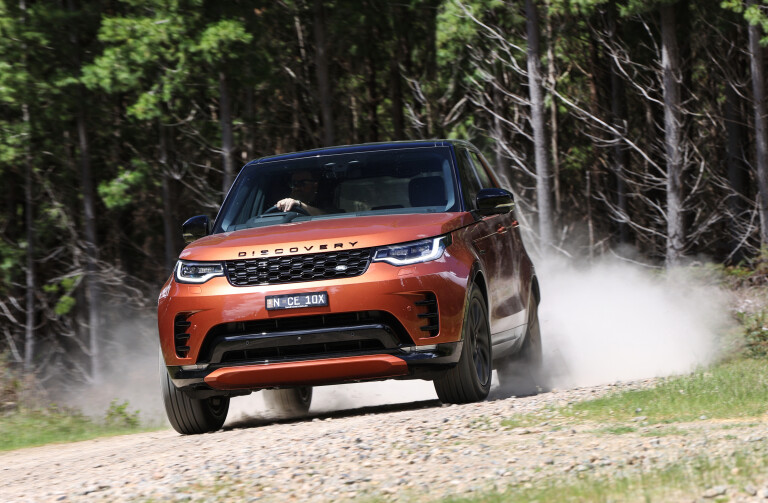
Things we like
- Smooth, effortless performance of new engine
- Dynamic chassis control
- Well-appointed interior
Not so much
- 20-inch low profile tyres
- Clumsy operation of powered rear seats
- Offset rear number plate
While all the automotive talk these days is of alternative power systems, there’s still plenty of development work going into the humble old internal combustion engine (ICE).
New technologies have allowed engineers to extract more performance and refinement from both petrol and diesel engines, while at the same time reducing emissions and improving fuel efficiency. It will be a long time before we see the end of the ICE. This is certainly the case in Australia, where our long distances and lack of EV infrastructure ensure that the ICE is the only viable automotive power source.
Land Rover is one brand leading the way in developing the ICE to keep it viable for as long as possible, and its Discovery 5 wagon now employs the brand’s latest petrol and diesel engines to keep them current.
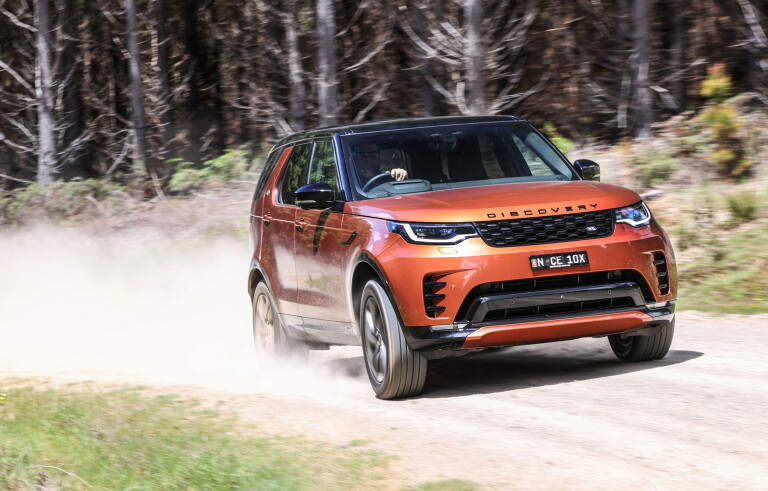
The 2021 model Discovery received a mid-life refresh which introduced new powerplants from the Ingenium engine family. Gone are the in-line four-cylinder and V6 diesel engines and in their place a choice of 3.0-litre in-line six-cylinder engines in both petrol and diesel.
We spent some time behind the wheel of the Discovery S P360 and D300 to compare the petrol and diesel offerings and note how the differences between the two are narrowing.
The MY21 Discovery S R-Dynamic P360 we are testing here retailed for $107,175, but as tested with options the price went up to $127,289. That was an older vehicle and there has been a MY22 Discovery since, but order a new Discovery now and you’ll be looking at the MY23 models where the R-Dynamic S P360 starts at $110,845.
POWERTRAIN & PERFORMANCE
It’s been many years since the Land Rover Discovery has been offered with a petrol-fuelled engine in Australia, so we were keen to get behind the wheel of the new offering. This is the 3.0-litre, mild-hybrid, supercharged and turbocharged in-line six-cylinder mill from the Ingenium family of engines.
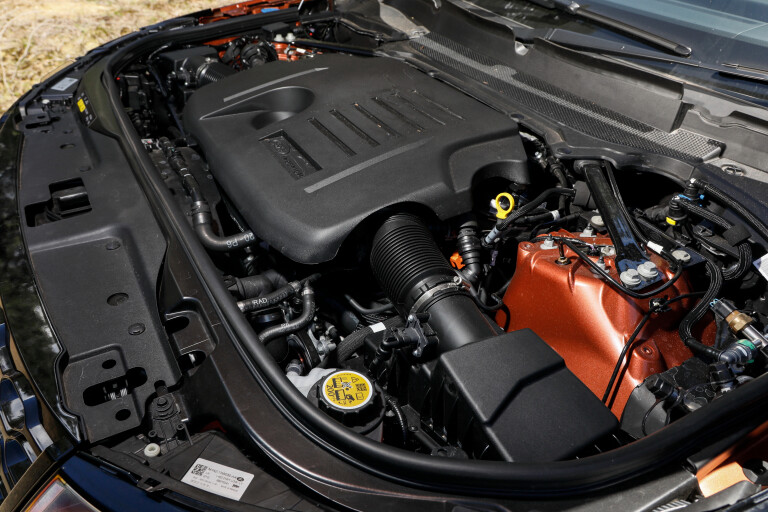
It is essentially the same engine as found in the P400 Defender 110, although this one runs a slightly milder tune to produce a still-healthy 265kW and 500Nm. That’s opposed to the 294kW and 550Nm of the Defender’s P400 variant and it leaves Land Rover Australia space to introduce a more powerful Discovery model should the re-introduction of petrol power prove popular here.
That said, the P360 tune lacks for nothing and is perfectly matched to the dynamic chassis of the Discovery. Petrol power brings a sporty feel that has been missing from the Disco for some time, as this engine loves to rev. With its 48V electric supercharger providing boost through the lower rev range and the turbocharger providing the crescendo up top, it’s a sweet package perfectly mated to the eight-speed ZF transmission.
ON-ROAD RIDE & HANDLING
An indicator of the type of buyer that today’s Discovery is aimed at is that 20-inch wheels are now the minimum size they are offered with, and factory options include 21- and 22-inch alloys. That’s not to say you can’t fit the 18- and 19-inch wheels of earlier Discovery 5s, but you would need to check with your LR specialist to see if they fit; particularly over the rear brakes.
The 20s clad in 255/55 liquorice straps combine with the height-adjustable independent suspension to deliver on-road dynamics that spur you to explore the range of the P360 engine and enjoy the performance the package presents.
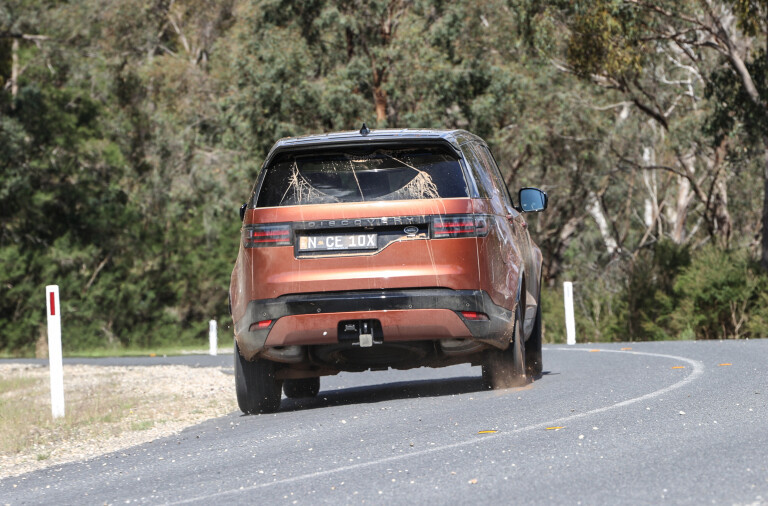
The modern Discovery is a superb on-road wagon delivering both a comfortable ride and exceptional handling, especially when you consider this car still has huge off-road potential. Assisting with this best-of-both-worlds feeling are adaptive dampeners which react to driver input, speeds and road conditions to adapt the shock absorbers to best suit the driving climate. These are standard across the Discovery range.
All petrol-fuelled Discoveries get the R-Dynamic pack, which is purely a styling pack and does nothing to the suspension or chassis.
OFF-ROAD
While the Disco is a superb and rewarding on-road drive, it still has plenty of off-road credentials. Sure, the low-profile, high-speed tyres are less than ideal for off-road use, but there are a few all-terrain tyre options available to suit that size if that’s your want.
The S might be the entry level in to the Discovery range, but it still comes standard with the height-adjustable suspension which allows for the road-hugging on-road height to be cranked up to give plenty of ground clearance for off-road use.
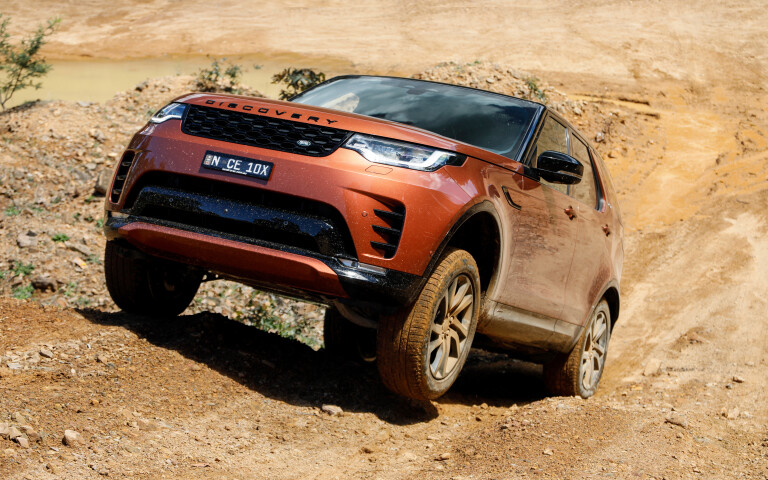
This was a MY21 model car, so the dual range was still standard – it’s an option now – and it was equipped with the $1110 optional rear locking differential, which is a must-have for off-road use. Along with the centre differential, it’s automatic and not driver selectable, but watching its operation on the off-road screen and you see how well it works in rough terrain.
Terrain Response now has an automatic mode among its selections, and you can leave it set there in all but the toughest conditions – be it sand, snow or rock. Selecting one of the specific modes, you can again see how the centre and rear differentials are sharper in their locking function and you can feel the slower throttle response and transmission holding its gears.
The functions all combine to give the Discovery plenty of forward drive, even when it’s lifting wheels or spinning tyres in mud. Ground clearance is rarely an issue in most reasonable conditions and the car’s dirt capabilities belie its on-road dynamics.
CABIN & ACCOMMODATION
All Discovery 5s are now sold as seven seaters and the third-row pew is suitable for adults, although getting in and out of the back can be awkward. This car also has power-operated third-row seats, which is an option and one we wouldn’t choose. We found them to be fussy in their operation, not always doing what we needed them to, while manual adjustment would have been quick and simple.
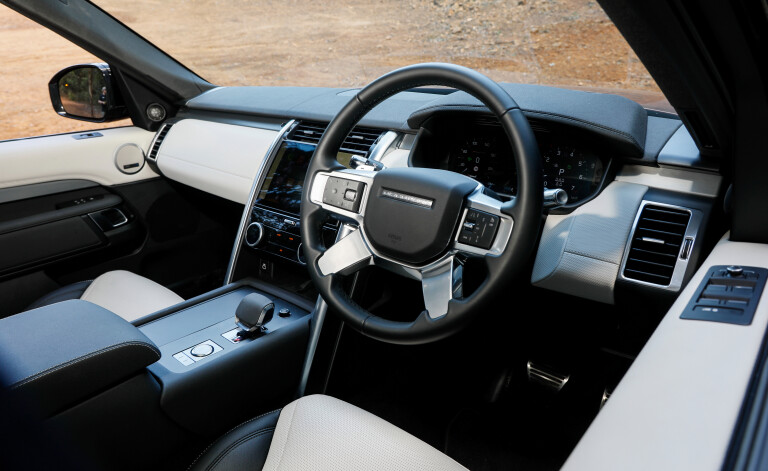
All seats are large and accommodating, making the Discovery an ideal all-road wagon for family use. The passengers are protected by a full suite of safety technologies including autonomous emergency braking, blind-spot monitoring, rear cross-traffic alert and 360° around-view cameras.
The Discovery’s cabin is very much that of a luxury SUV and in 2021 received an upgrade to accommodate the latest Pivi Pro entertainment system with its larger 11.4-inch centre touchscreen with Apple CarPlay, while the driver is greeted by a new dash with a 12.3-inch display behind the leather-wrapped tiller.
PRACTICALITIES
Such levels of safety, luxury and performance can blind the user to the fact that the Discovery 5 is still a wagon with true 4x4 capabilities. All Disco models have a 3500kg towing capacity, with sophisticated electronic towing programs to make towing easier and safer. Unlike other 4x4 wagons that claim such towing capacity, the Discovery has the power, torque and stability to haul such trailer weight.
As mentioned, the standard 20-inch tyres are not ideal for off-road or even all-road use, but there are some all-terrain tyre options available for these wheels and it’s worth investigating if the 18-inch wheels from earlier Disco 5s can be used. We’ve seen 265/60 BFG muddies fitted to aftermarket 18s on earlier D5s and these would prove very handy off-road.
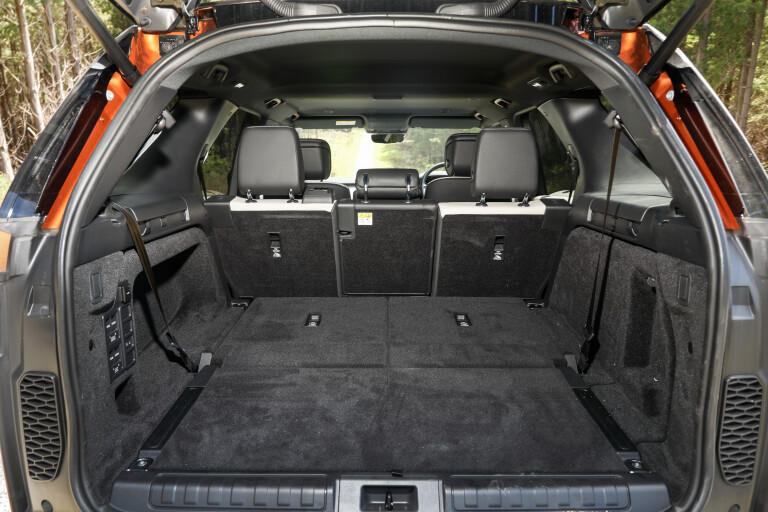
The Disco’s interior is big enough to accommodate family travels, and with the third-row seats folded into the rear floor, the cargo space is cavernous. There are cargo tie-downs in the rear plus a 12V power outlet to go with multiple 12V plug and USB power outlets throughout the cabin.
Unfortunately the Disco 5 has never been well-supported by the off-road aftermarket industry, so you’ll have a hard time finding a bullbar for one. There is a factory nudge bar available as well as a factory intake snorkel, while items like roof racks and other storage options are also available. You can also get lift rods to work with the air suspension to give the Disco a full-time 50mm suspension lift.
The Discovery’s greatest strength has always been its breadth of abilities and, while the D5 mightn’t be the all-road tourer its predecessors were, it has developed in the other direction toward more luxury, refinement and equipment.
PETROL VS DIESEL
The P360 Ingenium petrol engine produces its peak 500Nm torque from as low as 1750rpm right through to 5000rpm, delivering a very diesel-like feel to its bottom-end performance while still peaking higher in the rev range. At the same time as petrol engine technology has changed to allow such numbers, diesel engines have progressed to rev higher, run quieter and produce more power and torque as well.
As petrol and diesel Ingenium engines are relatively new and represent the latest in ICE development, we thought it ideal to compare them in the Discovery 5.
The Disco’s only diesel engine choice is the 221kW/650Nm D300 3.0-litre in-line six, and we again have it in the entry-level Discovery S model which starts at $101,875, although this one ticked the option boxes to take it up to $110,910.
As both cars were the S specification, they have similar levels of features and equipment and the same interior features, eight-speed auto, and suspension and 4x4 systems. So it was a great way to compare engines in vehicles that were similarly equipped and a similar price.
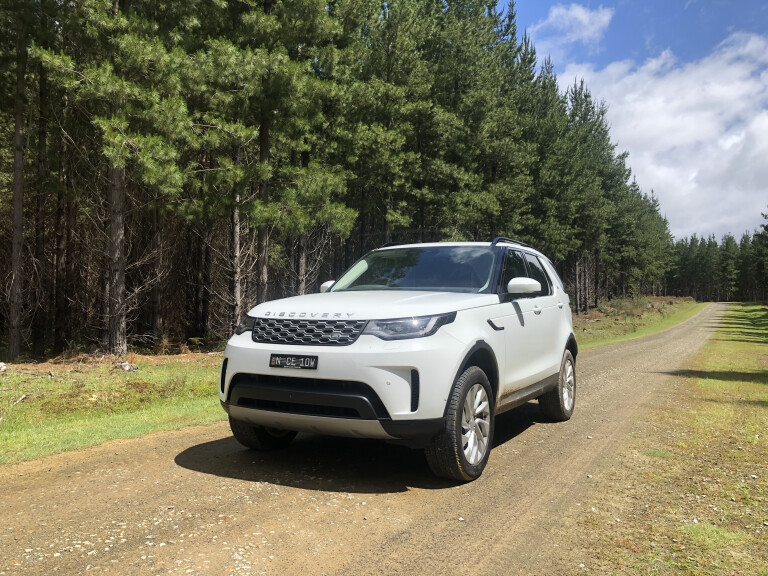
Push the start button on the D300 and the clatter of a diesel engine is evident, although it becomes less discernible as road speed increases. The diesel Ingenium engine doesn’t have the added boost of the electric supercharger that its petrol sibling enjoys, but it does use a twin turbocharger arrangement to supply its boost to make ample grunt.
Interestingly, Land Rover’s official zero to 100km/h figures show that the P360 is just 0.3 of a second quicker than the D300 to cover the dash, reaching that speed in just 6.5 seconds. So both wagons are reasonably quick considering their size, weight and intended function.
The D300 has more of a growl to its engine sound while the P360 is more subdued, but when the diesel is looking for the next gear around 5500rpm, the petrol keeps on accelerating, emitting a pleasing howl.
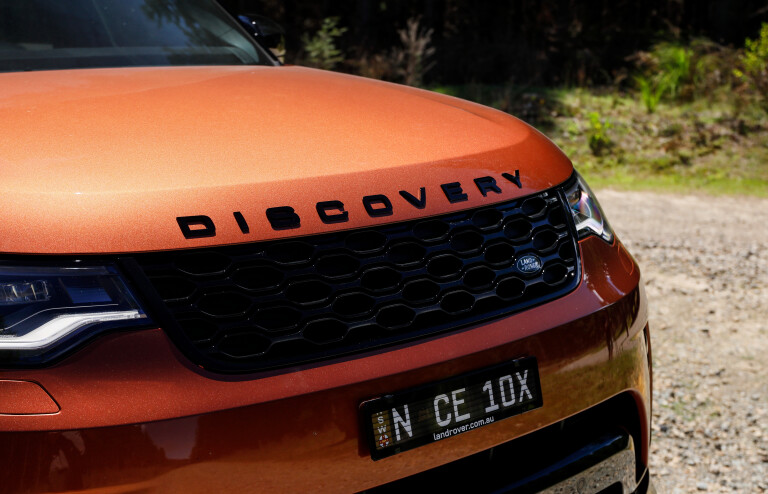
It’s this top-end rush that brings out the sporting character of the Land Rover’s chassis and rewards the enthusiastic driver on a mountain road. While a petrol engine has been absent from the Discovery for many years, the P360 Ingenium six is the perfect comeback.
Where petrol engines can’t match diesels is in terms of fuel usage, but, like the way they deliver power, the numbers are getting closer. Land Rover’s figures list the P360 as sipping 9.2L/100km driven and the D300 at 7.5L/100km. Our testing bagged 12.2L/100 in the gold P360 and 10.1L/100 in the white D300.
Unless doing long-distance, remote-area driving where every litre of fuel becomes essential, I couldn’t think of a reason to choose the diesel D300. The P360 petrol has the low-down torque of the diesel and adds a top-end charge to make the Discovery feel sporty, while at the same time being a little more refined in the way it does it.
DISCOVERY OR DEFENDER?
Ever since Land Rover introduced its L663 Defender, people have been asking where does this leave the Discovery model? After all, these two off-road-capable Land Rover vehicles are both five-door wagons (Defender 110) riding on variants of the D7 platform and sharing many of the same engines. Yet they do serve different owners and Land Rover has taken steps to further distance the two.
While they both ride on the same aluminium monocoque architecture and fully independent, height-adjustable suspension, the Defender’s D7x platform is made to be more off-road suitable with heavier duty suspension components and cross members, and taller ride-height available to deliver superior ground clearance.
The Defender’s cabin feels tall and narrow compared to the L462 Disco’s, which has more of a luxury SUV feel to it; and while the Defender certainly isn’t a stripped-out vehicle, it doesn’t have the same level of equipment, big screens and comfort features of its older sibling.
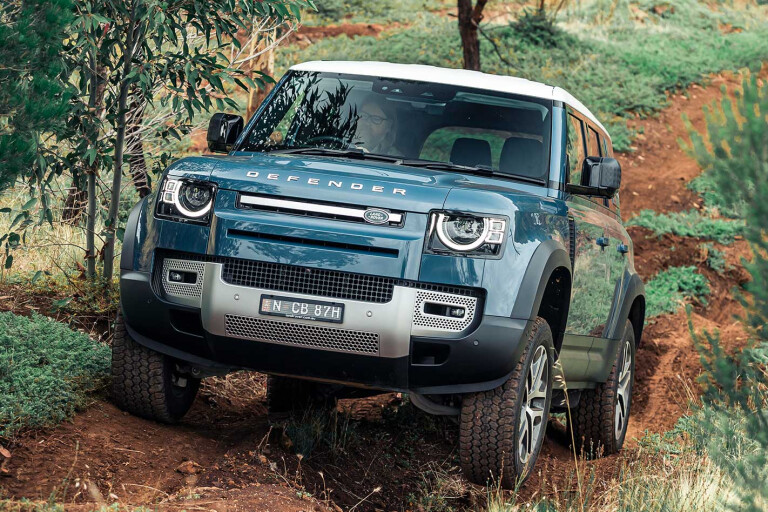
The Defender 110 is available in three, five, six or seven-seat configurations, while the three-row seven-seat model is more of a 5+2, with the third row of seating not so well-suited to adults.
From the MY22 model onwards, all Discoveries in Australia are sold as seven-seaters and the third row easily accommodates full-size passengers.
While the two models are mechanically similar and both are available with dual-range transfer cases, for the MY23 Discovery, a single-range, full-time transfer case is standard and dual range becomes a $940 option across the line-up, which is in keeping with the on-road use most Discovery owners will have for their vehicle. It will be interesting to see how many owners select this option in the future.
While they might share many of the same powertrain components and chassis designs, the Land Rover Discovery and Defenders are built to fill different niches and feel like very different vehicles. The Discovery remains an off-road-capable luxury SUV wagon, while the Defender has a sharper focus on off-road ability.
Early reports suggest the next generation of Discovery could switch to a new lighter duty platform that is more suitable to EV and hybrid powertrains, which would further distance itself from the Defender.
Land Rover Discovery S R-Dynamic P360 specifications
| ENGINE | Mild hybrid petrol I6 |
| CAPACITY | 2995cc |
| MAX POWER | 265kW @ 5500-6500rpm |
| MAX TORQUE | 500Nm @ 1750-5000rpm |
| GEARBOX | 8-speed automatic |
| CRAWL RATIO | 57.21:1 |
| 4X4 SYSTEM | Full-time, dual range 4x4. Auto locking centre and rear diffs |
| CONSTRUCTION | 5-door wagon on monocoque chassis |
| FRONT SUSPENSION | Height-adjustable independent air |
| REAR SUSPENSION | Height-adjustable independent air |
| TYRE/WHEEL | 255/55-R20 on alloy wheels |
| KERB WEIGHT | 2417kg |
| GVM | 3210kg |
| PAYLOAD | 793kg |
| TOWING CAPACITY | 3500kg |
| SEATING | 7 |
| FUEL TANK | 90L |
| ADR FUEL CLAIM | 9.2L/100km |
| ON-TEST FUEL USE | 12.2L/100km |
| DEPARTURE ANGLE | 30° |
| APPROACH ANGLE | 34° |
| RAMPOVER ANGLE | 27.5° |
| GROUND CLEARANCE | 283mm |
Things we like
- Smooth, effortless performance of new engine
- Dynamic chassis control
- Well-appointed interior
Not so much
- 20-inch low profile tyres
- Clumsy operation of powered rear seats
- Offset rear number plate



COMMENTS